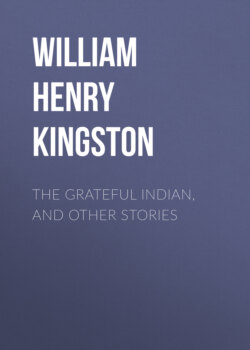Читать книгу The Grateful Indian, and Other Stories - William Henry Giles Kingston - Страница 7
На сайте Литреса книга снята с продажи.
II.
ОглавлениеThere are different tribes. Some are called Crees, others Ojibways or Salteaux, and these are constantly at war with the Sioux to the south, chiefly found across the United States boundary. There are also found on the prairies Assiniboines, Blackfeet, Bloodies, and others with scarcely more attractive names. All these people were at that time sunk in the most abject state of heathenism, and were constantly at war with each other. They were clothed chiefly in skins made into leather, ornamented with feathers and stained grass and beads. The tents of the prairie Indians were of skins, and those of the Indians who inhabit the woods of birch bark. Many had rifles, but others were armed only with bows and spears, and the dreadful scalping-knife. Of these people the Sioux bore the worst character, and were the great enemies of the half-bred population of the settlements. These halfbreds, as they are called, are descended from white fathers and Indian mothers. There are some thousands of them in the settlements, and they live chiefly by hunting and fishing, and retain many Indian customs and habits of life. Such was the strangely mixed community among whom we found ourselves.
The autumn was coming on, and the days were shortening, but the weather was very fine—sharp frosts at night, though warm enough, yet bracing, with a bright sky and pure atmosphere during the day. Sometimes a light silvery mist or haze hung over the landscape. Such is the Indian summer, the most delightful period of the year in North America.
The day’s work was over, and while my brother and I were preparing the table, and Sam Dawes was cooking the supper, we were startled by a loud and peculiar shout, or rather shriek. Our father, who had been sitting reading, started up, and taking his rifle from the wall, turned to the door. Sam, quitting his frying-pan, also took down his rifle and followed with us. In the distance was an Indian decked with war paint and feathers bounding over the ground towards us, while further off were five or six more, as if in hot pursuit of the first.
“That first fellow is an Ojibway by his adornments, and a young man by the way he runs,” observed Sam. “He’s seeking protection here, that’s poz.”
“And he shall enjoy it, though we should have to fight for him,” observed my father warmly. “We must teach the Red men that we always protect those in distress.”
The fugitive came on at great speed. He was flying for his life. His pursuers, however, were gaining on him. They had fire-arms in their hands, but did not use them.
“They have exhausted their powder,” observed my father. “That is fortunate.”
The young Indian was within fifty yards of us. We could see the gleam of the scalping knives which his foes had drawn, thirsting for his blood. He bounded on up to the door of the hut and fell exhausted within. Then for the first time his pursuers perceived that we stood armed at the entrance. Guessing truly that we possessed plenty of ammunition, and two or more of their number might fall if they attempted to advance, they paused, casting glances of disappointed vengeance towards their victim, who lay unconscious behind us. Our father told Malcolm and me to take him in and to try and revive him. We did so, and when we had moistened his lips with water he quickly revived. Springing up he seized Malcolm’s gun and hurried to the door. The other Indians had not moved. On seeing him, however, they instantly darted behind some trunks of trees for shelter, and then we saw them darting away till they got beyond range of our fire-arms. The young Indian would have followed, but my father restrained him, and gave him to understand that though he had saved his life he had no intention of allowing him to take the lives of others. Darkness was coming on, and we soon lost sight of the band. Having closed our door with more than usual care, we placed food before our guest, of which he eagerly partook, and then told us that his name was Sigenok; that he with others of his tribe had been out hunting, and had been surprised by a war party of Sioux, who had taken the scalps of all the rest. He had wandered away unarmed from the camp when he saw all his companions killed. To revenge them, which the Indian thought was his first duty, was then impossible, so he took to flight, hoping to retaliate on another occasion. His wary foes, however, discovered his trail and followed. He had caught sight of them when they were not aware of it, and redoubled his speed, making for the settlements. He gave us to understand that he could not have continued his flight many more hours, and that he was very grateful to us for preserving his life. We had brought a dog from England, and we had lately got another, both very sagacious animals, and so we stationed them outside the hut at a little distance to give us due notice should the Sioux return.
Sigenok, as soon as he had satisfied his hunger, proving his confidence in us, laid himself down in a corner of the room and was immediately fast asleep. He spent two days with, us to recover his strength, which had been greatly tried, and then set off to carry to his tribe the sad tidings of the loss of their friends. For an Indian, he was a good-looking young man, and decked with his war paint and feathers he had a picturesquely savage appearance.
